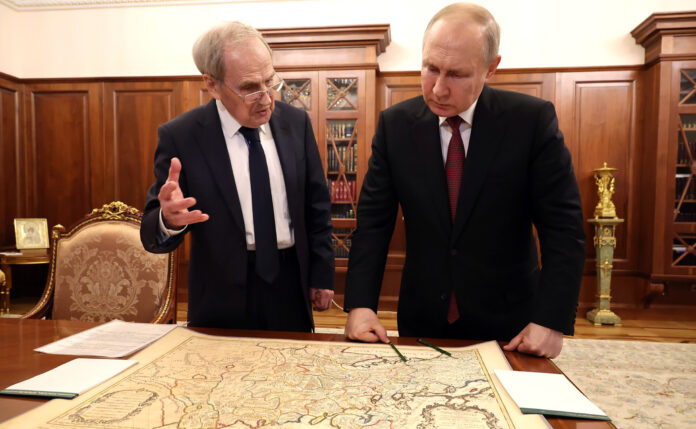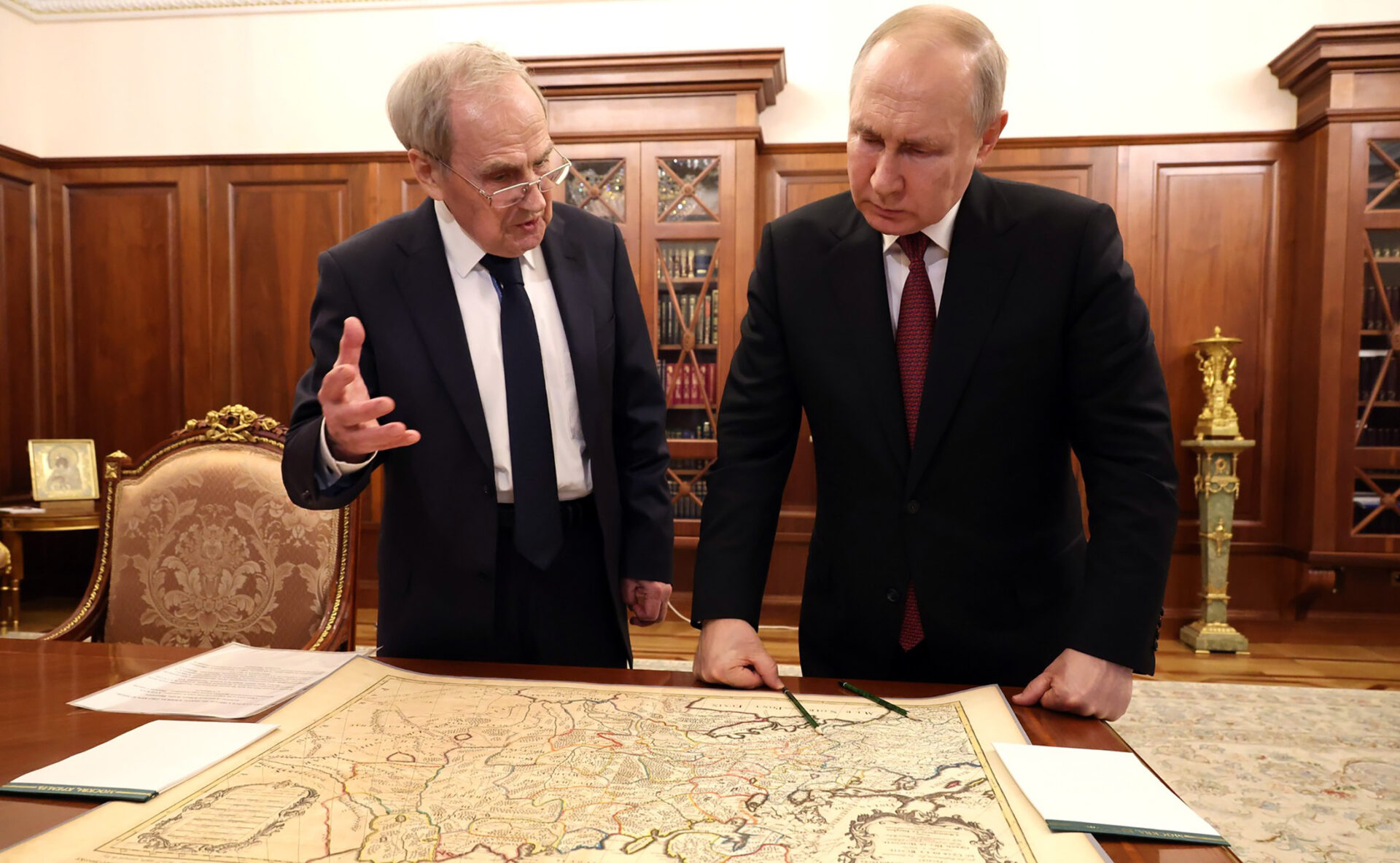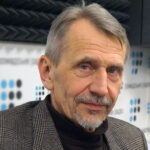In this paper, the Ukrainian political scientist and thinker explains how the Russian imperial vision of Ukraine has penetrated deep into Western society, how its most toxic myths and clichés have been uncritically accepted and normalized, and how this has helped to spread the rhetoric of Russian propaganda around the world for years, and even recently. The reality on the ground of the war has helped to deconstruct these myths, but Ukrainian intellectuals and their Western colleagues must continue this work.
Russia’s spectacular failure to achieve its declared goals on the first days, weeks and eventually months of the all-out military invasion of Ukraine was attributed primarily to Moscow’s miscalculation: a profoundly wrong assessment of both its own strength and Ukraine’s weakness. Experts generally agree that the blunder was determined by two intertwined factors: the rigidity of Putin’s authoritarian system that frustrates the effective flow of information, especially if that information is unflattering for the bosses; and secondly, Russians’ fundamentally biased, ideologically distorted view of themselves and — especially — of Ukraine that precludes an adequate response to the situation on the ground.
“Ukraine denial”
That view was quintessentially articulated by Vladimir Putin in his notorious dictums that Ukraine “is not even a country” and that Ukrainians and Russians are “one people.” Russian politicians and ideologists parroted that mantra vehemently and developed it at length, including Putin himself who indulged in producing quasi-historical treatises to prove that Ukraine has never existed and should not ever exist as a nation separate from Russia.
“Ukraine denial” was certainly not invented by Putin. It has been a cornerstone of Russian (imperial) identity since the very invention of “Russia” in the first quarter of the 18th Century. Ukraine was a centerpiece of that construction insofar as a transformation of Eurasian Muscovy into European “Russia” under Peter the Great required appropriation of the name and legacy of Kievan Rus which was primarily Ukrainian and partly Belarusian but only remotely and marginally Muscovite. To that aim, the political continuity between 12th Century Kyiv and 17th Century Muscovy was invented, the quasi-Latinized name of “Russia” was coined to semantically equate Moscow tsardom with Kievan Rus (a medieval entity that ceased to exist five centuries earlier under the nomadic assault), and claims to the old Rus legacy were made with far-reaching consequences.
A tricky semantic manipulation (Rus = Russia) legitimized Moscow’s alleged entitlement to the entire Rus history (which was only minutely Muscovite), enhanced its demands for the whole Rus territory (which had for centuries been part of the Polish-Lithuanian Commonwealth) and, worse of all, delegitimized the very existence of Ukrainians and Belarusians who were inevitably downgraded to a regional brand of “Russians” (in fact, of Muscovites rebranded as “Russians”) within that mythical narrative. Ukrainians who insisted on their distinct identity, maintained their language as a fully-fledged means of communication, and strove to develop high culture beyond permitted ethnography, were reasonably perceived as enemies, a subversive force that undermined the empire’s integrity and legitimacy. Ukraine thus remained a dangerous witness of an historical theft, an unsurmountable obstacle in a smooth appropriation of the Rus legacy. It was indeed an alien body in the otherwise wonderful mythical picture. That nuisance should be definitely absorbed, digested, and appropriated — or destroyed.
Since then, Russian attitude and policies vis-à-vis Ukraine were determined by some sort of existential anxiety — not only because without Ukraine Russia would cease to be an empire in geopolitical terms, as Zbigniew Brzezinski famously put it, but also because it would cease to be an empire in its essence — culturally and psychologically. Without Ukraine, Russians would have to undergo a painstaking review of their identity, to invent a new historical narrative stemming from Moscow rather than Kyiv, and to develop a new idea of Russianness that does not include Ukraine as its constitutive part. In sum, Russia would have to become a “normal” European nation-state within fixed, internationally recognized and universally accepted borders, rather than an ever-expanding empire with messianic claims and ungrounded resentment.
Putin did not invent anything new in his ardent denial of independent Ukraine, he merely reinvigorated the Ukrainophobic ideas of Russian philosophers from the 19th and early 20th centuries — ideas that were wisely replaced by the Soviets with a much subtler (and more perfidious) theory of “rapprochement and ultimate fusion” of “brotherly” nations. Putin, who castigates Bolsheviks as alleged destroyers of the empire and inventors of various Soviet nationalities, in particular Ukraine, is fundamentally wrong. Bolsheviks, in fact, rescued the empire by making some (temporary) concessions to nationalists in the empire’s peripheries, something that their opponents-monarchists with Putin’s pet hero Anton Denikin staunchly refused to do and therefore lost. Putin, like his monarchist predecessors, is really “obsessed with Ukraine and its unique significance for Russian national identity,” as Igor Torbakov observes. “For him, the 1991 ‘schism’ that resulted in Ukraine’s independence cut right through the Russian national body, having deprived Moscow not only of the millions of its kin and vast ‘historical Russian lands’ but, more crucially, of the most precious and ancient part of ‘Russia’s’ own history.”1 The only novelty he introduced into that Ukrainophobic world view was not in theory but in practice. He decided to solve the “Ukrainian question” once and for all by launching a genocidal war.
Predictably, the heavily biased, ideologically distorted view of reality precluded both the adequate perceptions of facts and their reasonable interpretation. Since Ukraine was programmatically declared “not even a country” and Ukrainians defined as “one people” with Russians, anything that ran contrary to this view was ignored or downplayed as insignificant, temporary, exogenous, and artificial — a minor deviation from the imaginary (“all-Russian”) normality, easily fixable by appropriate social engineering.
Ukraine’s ambiguity
Ukraine itself sent mixed messages to Russian ideologists, inasmuch as only some Ukrainians (roughly one third of the population) stood firm in the 1990s for a radical break with the communist past (seen also as colonial) and for a rapid and fully-fledged integration into Euro-Atlantic structures. The other part, a “silent majority”, was rather reluctant to give up their habitual way of life and change their convenient, however uncomfortable, environment. A bird in the hand was worth two in the bush; a familiar post-Soviet kommunalka prevailed over a hazy “European Community” where “nobody waits for us” (as post-Soviet politicians recurrently emphasized). Ukrainians had never been anti-Western, like many Russians. But they hoped, rather naively, to have the best of both worlds: to access European modernity but retain mental ties with archaic imaginary Orthodox/East Slavonic ummah; to embrace European democracy, freedom, and rule of law but maintain the informal institutional practices of increasingly authoritarian post-Soviet “Eurasia.“
Many observers confused this ambivalence with “pro-Russian” orientation, and Russian politicians and ideologists were the most eager to believe it. They neglected, however, two underlying phenomena that ultimately determined Ukraine’s drift. One was grassroots Ukrainian patriotism that in all critical situations (e.g. in the 2003 conflict with Russia over Tuzla Island) offset residual East Slavonic attachment and led ultimately to a radical break with that imaginary community. And the second underappreciated phenomenon was a different, more individualistic, and non-authoritarian political culture that Ukrainian society preserved despite centuries of Russification/ Sovietization. It remarkably came to the fore in the 2000s, when Ukrainian rulers tried to emulate the authoritarian practices of their Russian and Belarusian counterparts.
By 2012, pro-Western attitude in Ukrainian society, for the first time, prevailed over “East Slavonic” attitude. This reflected the growing attractiveness of the EU, a broad impact of its soft power, but also internal changes in Ukrainian society that remained throughout the post-Soviet years relatively free, open, and pluralistic. Generational change probably also played a part, as well as increasing authoritarianism in neighboring Russia which further undermined the attractiveness of that country and of the “Eurasian” choice. The Revolution of Dignity (aka Euromaidan, 2013-14) was the result of that pro-European shift rather than its cause, though it undoubtedly catalyzed past mental developments in society and accelerated Ukraine’s political Westernization. Russia’s 2014 invasion put an effective end to Ukraine’s protracted ambivalence, dealing a deadly blow to the “East Slavonic” attachments of many people and relegating those attitudes to the realm of infantile fantasies and wishful thinking.
Yet remarkably, the entire Russian elite appeared to be blind and deaf vis-à-vis those developments. They simply ignored or downplayed everything that did not fit their habitual view of Ukraine as “not even a country” and Ukrainians as “one people” with Russians. Overwhelming support (over 90%) for national independence in the 1991 referendum was interpreted as a purely economic vote masterminded by opportunistic postcommunists and nationalists who tricked the gullible population into something they never cared for. The 2004 Orange Revolution was understood not as a spectacular surge of civic activity and “people’s power” but as a Western conspiracy against Russia. (Ukrainians, within this supremacist logic, could not themselves stand for ideals of freedom, justice, and dignity, but had to be paid for this by some Western masters). The same interpretative frame was applied to Euromaidan in 2013-14. Nor even the failure of “the Russian Spring” and “Novorossiya“ project in Ukraine’s southeast in 2014-15 made Russian ideologues review their habitual view of Ukrainians as “almost Russians” who were tricked or forced by nationalists (proverbial “junta”) into an artificial state-building project, where they presumably had no stakes to care for and defend. The Russian elite apparently projected upon Ukrainians their own situation — of a political clique that captured the state and imposed unchecked dominance over the pliable population.
“Imperial knowledge”
All these distorted views and biased interpretations of Ukrainian reality go far beyond sheer supremacism, rather typical for all imperial nations vis-à-vis their colonies (seen as a “lesser people of the lesser world” in Edward Said’s words). In this particular case, Russia’s dismissive view of Ukraine is based on the coherent, elaborate system of quasi-historical assumptions and arguments that create quite a powerful imperial ideology and assign peculiar meaning and value to anything it encounters. That ideology oddly places Ukraine at the very center of Russian identity and makes its holders agonize over the perceived incompleteness of that identity as long as Ukraine (and Kyiv, the most precious part of Russia’s imaginary self) is off. Russian imperial thinkers articulated that feeling long before Putin. As early as 1911, Petr Struve envisioned Ukraine’s (possible) secession in apocalyptic terms: should it happen, he wrote, the result would be the “gigantic and unprecedented schism of the Russian nation (…), a veritable disaster for the state and for the people.”2
We may define that system of imperial, ideologically informed and driven narratives as “imperial knowledge”, — a set of facts, inventions, and interpretations that aims, on one side, at a glorification of the empire, its supposedly great, universal culture and unique historical role, and, on the other side, at a depreciation, marginalization, and sheer appropriation of cultures of subordinate nations, and monopolization of a God-given (or history-given, under the Soviets) right to speak on their behalf. This enables the empire to silence subaltern groups and make them completely invisible.3
Since the 18th Century, the empire had institutionalized all those narratives in schooling and scholarship, high and mass culture, political discourses and church practices, imperial laws and civic rituals. It developed “imperial knowledge” as a holistic explanatory frame for anything in its history and in current relations with the external world and its own colonies. It can be defined, after Edward Said, as a peculiar Russian style for “dominating, restructuring, and having authority over” subaltern people.4 Or, as Larry Wolff may have put it, a “style of intellectual mastery, integrating knowledge and power, perpetrating domination and subordination” and suitable therefore not only for rhetorical exercises but also for “real conquest .”5
In the most tragic twist of events, toxic — supremacist, jingoistic, and simply fraudulent — “imperial knowledge”, produced and disseminated by Russian imperial institutions and gentrified and legitimized by obsequious imperial intellectuals, became international. It strongly influenced Western academia, media, mass culture, and common wisdom. The world both adopted and normalized it; the international public tuned its sensors to imperial messages as presumably the most comprehensive, ‘important’ and authoritative — rather than to the marginal voices of minor, subaltern and ‘less important’ nations. Common wisdom does not require any proof; it is something that everybody knows. There is no need to question or problematize it.
This explains why Ukraine had been invisible to the Western gaze for a few centuries and why, even after its emergence on the political map of Europe in 1991, it remained a big blind spot on mental maps. This also explains why Ukraine’s bravery and resilience under the Russian assault came as a big surprise not only for Moscow, but also for most Westerners: they shared the same view of Ukraine as a highly corrupt, almost dysfunctional state, and a deeply divided, almost irretrievably broken society.6
This explains why Ukraine had been invisible to the Western gaze for a few centuries and why, even after its emergence on the political map of Europe in 1991, it remained a big blind spot on mental maps. This also explains why Ukraine’s bravery and resilience under the Russian assault came as a big surprise not only for Moscow, but also for most Westerners: they shared the same view of Ukraine as a highly corrupt, almost dysfunctional state, and a deeply divided, almost irretrievably broken society.7 Their attitude toward Ukraine differed politically but not epistemologically. And this graphically illustrates how deeply Russian “imperial knowledge” penetrated Western society, how its most toxic myths and clichés were uncritically accepted and normalized, and how this facilitated for years, until recently, the global spread of Russian propagandistic discourses. To deconstruct that “knowledge” and exorcise its malignant spell is a primary task that we, as intellectuals, encounter today, however belatedly.
Mykola Ryabchuk is a research director at the Institute of Political and Nationality Studies of the Academy of Sciences of Ukraine and a lecturer at the University of Warsaw. He has written extensively on civil society, nation-state building, national identity, and post-communist transition. One of his books has been translated into French: De la 'Petite-Russie' à l'Ukraine, published in Paris by L'Harmattan in 2003.
Footnotes
- Igor Torbakov, The Kremlin’s Nationalist Utopia. Eurozine, 26 April 2023.
- Petr Struve, “Obshcherusskaia kul’tura i ukrainskii partikuliarizm: Otvet Ukraintsu,” Russkaia mysl’, no. 1 (1912), 85.
- Ewa Thompson, Imperial Knowledge: Russian Literature and Colonialism (Westport, CT and London: Greenwood, 2000).
- Edward Said, Orientalism (London, 1978), 3.
- Larry Wolff, *Inventing Eastern Europe: The Map of Civilization on the Mind of the Enlightenment *(Stanford, 1994), 8.
- Taras Kuzio attributes this to an excessive influence on the Western policy makers from the Russianists who have no expertise in Ukraine, Georgia, or Estonia but do not hesitate to make far-reaching judgements on any development in any post-Soviet country. This is why the Westerners got Ukraine wrong, Kuzio contends, — and they got it wrong exactly in the same way and for the same reasons as Russians did. Taras Kuzio, If you’re an expert on Russia it does not make you an expert on Ukraine, Georgia, or Estonia. Youtube, 24 April 2023.
- Taras Kuzio attributes this to an excessive influence on the Western policy makers from the Russianists who have no expertise in Ukraine, Georgia, or Estonia but do not hesitate to make far-reaching judgements on any development in any post-Soviet country. This is why the Westerners got Ukraine wrong, Kuzio contends, — and they got it wrong exactly in the same way and for the same reasons as Russians did. Taras Kuzio, If you’re an expert on Russia it does not make you an expert on Ukraine, Georgia, or Estonia. Youtube, 24 April 2023.




